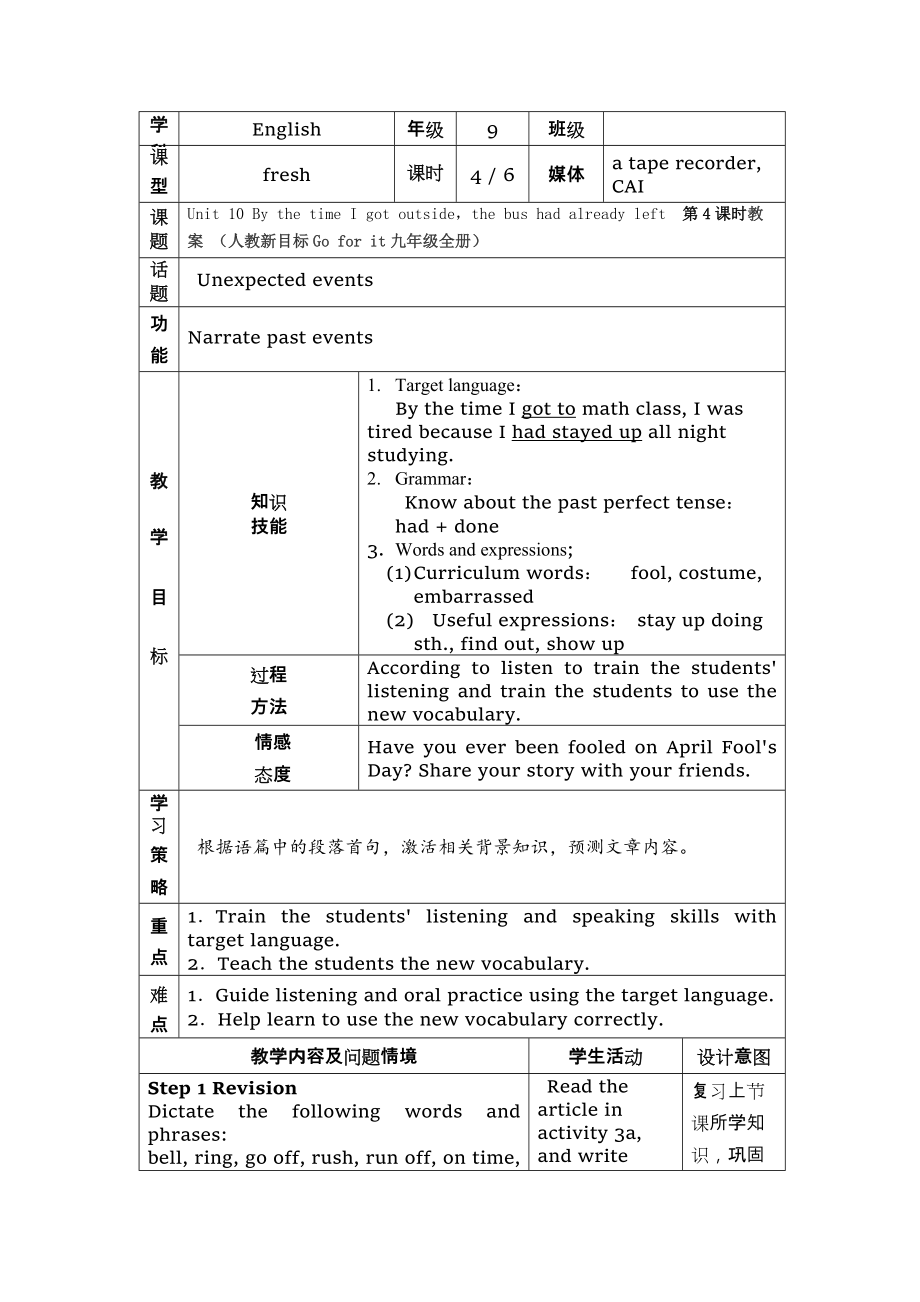《Unit 10 By the time I got outsidethe bus had already left第4課時(shí)教案 (人教新目標(biāo)Go for it九年級(jí)全冊(cè))》由會(huì)員分享,可在線閱讀�����,更多相關(guān)《Unit 10 By the time I got outsidethe bus had already left第4課時(shí)教案 (人教新目標(biāo)Go for it九年級(jí)全冊(cè))(3頁(yè)珍藏版)》請(qǐng)?jiān)谘b配圖網(wǎng)上搜索����。
1��、
學(xué)科
English
年級(jí)
9
班級(jí)
課型
fresh
課時(shí)
4 / 6
媒體
a tape recorder, CAI
課題
Unit 10 By the time I got outside�,the bus had already left 第4課時(shí)教案 (人教新目標(biāo)Go for it九年級(jí)全冊(cè))
話題
Unexpected events
功能
Narrate past events
教
學(xué)
目
標(biāo)
知識(shí)
技能
1. Target language:
By the time I got to math class
2���、, I was tired because I had stayed up all night studying.
2. Grammar:
Know about the past perfect tense: had + done
3. Words and expressions;
(1) Curriculum words: fool, costume, embarrassed
(2) Useful expressions: stay up doing sth., find out, show up
過(guò)程
方法
According to liste
3����、n to train the students' listening and train the students to use the new vocabulary.
情感
態(tài)度
Have you ever been fooled on April Fool's Day? Share your story with your friends.
學(xué)習(xí)策略
根據(jù)語(yǔ)篇中的段落首句���,激活相關(guān)背景知識(shí)��,預(yù)測(cè)文章內(nèi)容��。
重點(diǎn)
1.Train the students' listening and speaking skills with target language.
2.Teach
4���、 the students the new vocabulary.
難點(diǎn)
1.Guide listening and oral practice using the target language.
2.Help learn to use the new vocabulary correctly.
教學(xué)內(nèi)容及問(wèn)題情境
學(xué)生活動(dòng)
設(shè)計(jì)意圖
Step 1 Revision
Dictate the following words and phrases:
bell, ring, go off, rush, run off, on time, give sb. a ride ,loc
5、k, break down.
Step 2 Presentation
Ⅰ1a
1.Read the instructions to the students. Point to the chart with the three headings—Nouns, Verbs and Adjectives, and help the students to understand the meanings of nouns, verbs and adjectives.
2.Teach Ss to read the new vocabulary below:
costume, fool, go
6�、 off, get dressed, show up, change, embarrassed, empty, fool, stay up.
3.Ask Ss to put the words in the correct columns.
Ⅱ 1b
1.Ask Ss to work in pairs.
2.After they all finish talking, ask some pairs to say their conversations to the class.
Ⅲ. 2a
1.Say something about April Fool's Day to
7、the students like this:
2.Ask the student to pay attention to the four pictures. Ask four different students to describe the pictures.
3.Please listen to the tape,
Ⅳ.2b
1. Ask the students to find out who says each of the phrases,
2.Ask six different students to report their answers to the cla
8���、ss. Check the answers with the class.
Ⅴ. 2c
1.Ask the students to look at the sample conversation on the right. Ask a pair of the students to read and try to continue .
2. Ask the students to work in pairs. Each pair makes two conversations using information from 2a and 2b.
Step3. Summary
1.lis
9�、tening and oral practice using the target language.
2.Use the new vocabulary correctly.
Read the article in activity 3a, and write some phrases on exercise book.
Put the words in the correct columns in the chart .
Make new conversations, use two or more phrases from the list
10、 in Activity 1a.
Listen and write each person’s name under the correct picture.
Listen again and
write “D” for Dave, “N” for Nick and “J” for Joes on the short lines before the phrases.
Tell the April Fool’s Day stories . Use the information from 2a and 2b.
復(fù)習(xí)上節(jié)課所學(xué)知識(shí)�����,鞏固重要短語(yǔ)��,句型���。
11����、
��。
辨別詞性���,理解詞語(yǔ)意思。
通過(guò)語(yǔ)言交際��,提高學(xué)生口語(yǔ)能力����。
完成不同聽(tīng)力任務(wù),提高聽(tīng)力能力。
根據(jù)2a和2b創(chuàng)作自己的對(duì)話�,復(fù)習(xí)目標(biāo)語(yǔ)言。
板
書(shū)
設(shè)
計(jì)
Section B 1a ~ 1c
By the time I got to math class, I was tired because I had stayed up all night studying.
By the time people realized that the story was a hoax, all of the spaghetti across the country had been sold out.
反
思
 Unit 10 By the time I got outsidethe bus had already left第4課時(shí)教案 (人教新目標(biāo)Go for it九年級(jí)全冊(cè))
Unit 10 By the time I got outsidethe bus had already left第4課時(shí)教案 (人教新目標(biāo)Go for it九年級(jí)全冊(cè))

